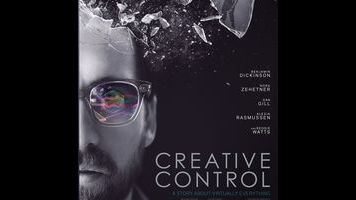The sci-fi indie Creative Control imagines the hipster future

The central metaphor of Nicholson Baker’s 1994 novel The Fermata is the Fold, the narrator’s power to freeze time, which he uses more or less exclusively to undress unsuspecting women and jerk off. It’s a crude but elastic way to depict the rapid, ceaseless workings of the erotic imagination, and one of Baker’s more memorable forays into descriptive mania and purely literary time. The Fermata comes to mind (wordplay unintended, but welcomed) a lot in Benjamin Dickinson’s sci-fi indie Creative Control, which combines a satire of corporate hipsterdom with a metaphor for personal alienation and sexual fantasy, without ever completely committing to either. Its version of the Fold is Augmenta, a next-gen augmented reality gadget that falls into the hands of an ad man (Dickinson), who uses it more or less exclusively to develop a digital facsimile of his best friend’s girlfriend (which only he can see) and jerk off.
Creative Control is set in “near-future Brooklyn,” represented through impeccable open offices and bedrooms lit with roly-poly Ikea Jonisk lamps. Dickinson’s pill-popping, carefully bearded David is an executive at an ad agency, where his biggest client is Phalinex, a smokeable anxiety medication whose long list of horrifying side effects begins with “burning toenails.” He lives with his yoga teacher girlfriend, Juliette (Nora Zehetner), but pines—at first unconsciously—for struggling fashion designer Sophie (Alexia Rasmussen), who is dating his photographer buddy Wim (Dan Gill). Dickinson and co-writer Micah Bloomberg lace everything with parodic dialogue; this is a world where “You’re establishing your brand” passes for encouragement and a woman asks, “How much do you think it costs to lease an electric car?” while her boyfriend fondles her breasts.
 Keep scrolling for more great stories.
Keep scrolling for more great stories.
